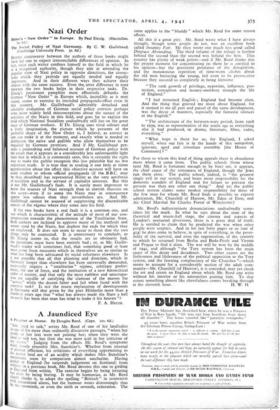Nazi Order
The Social Policy of Nazi Germany. By C. W. Guillebaud. (Cambridge University Press. 3s. 6d.) gEcsgr controversy between the authors of these books might have led one to expect irreconcilable differences of opinion. In fact, since each writer confines himself to the field in which he is a recognised authority, though they aim at amending the popular view of Nazi policy in opposite directions, the correc- tions which they provide are equally needed and equally important. And in their different ways they achieve their objects with the same success. Even the, utter difference in tone between the two books helps in their respective tasks. Dr. Einzig's passionate pamphlet most effectively debunks the German " New Order " in Europe which, incredible as it may sound, seems to exercise its intended propaganda-effect even in this country. Mr. Guillebaud's admirably detached and scholarly evaluation of german social policy corrects perhaps even more widely held misconceptions about the nature of the activities of the Nazis in this field, and goes far to explain the hold which National Socialism undoubtedly still has on the great mass of German workers. If Dr. Einzig uses vivid colours and a lively imagination, the picture which he . presents of the probable shape of the New Order is, I believe, as correct as one can make it at the moment, and exactly what is needed to disillusion the naive and gullible who allow themselves to be beguiled by German promises. And if Mr. Guillebaud pre- sents a painstaking and balanced account of German policy with the result that it appears in a considerably less unfavourable light than that in which it is commonly seen, this is certainly the right way to make the publie- recognise this less palatable but no less important truth. It is true that in reading it one feels at times apprehensive about the effect this objective account will have on some readers to whom -official propaganda (if the may be thus described) has represented Hitler as the very antithesis of socialism and as the servant of capitalist interests. But this is not Mr. Guillebaud's fault. It is surely more important to know the sources of Nazi strength than to cherish illusions on this score—even if to some -the Nazis may in consequence appear less odious than they nevertheless are. And Mr. Guillebaud cannot be accused of suppressing the discreditable aspects of the regime where they come into his field.
If the two books have a real fault it is a common one, and one which is characteristic of the attitude of most of our con- temporaries towards the phenomenon of the Totalitarian State. Both authors are inclined to approve many of the methods and means used by the Nazis, but deplore the ends for which they are employed. It does not seem to occur to them that the two things may be connected. It is unnecessary to conclude, as Dr. Einzig seems to, that the results are so obviously bad,
the intentions must have been entirely bad ; or, as Mr. Guille- baud's reader will sometimes feel, that something good at least must come from measures which in themselves are so similar to what has long been advocated by social reformers elsewhere. Is it not possible that all that planning and direction, which in Germany longer than elsewhere has been universally demanded, necessarily require a "totalitarian " regime, arbitrary prefer- ences, the use of force, and the institution of a new hierarchical order of society, and that only the most ruthless and unscrupu- lous are capable of satisfying the 'clamour of the masses for "action," while the decent falter and fail when faced with the concrete task? Is not the truest explanation of developments in Germany still that given by the poet HOlderlin more than a hundred years ago that " what has always made the State a hell on earth has been that man has triad to make it his heaven "?
F. A. HAYEK.


























 Previous page
Previous page